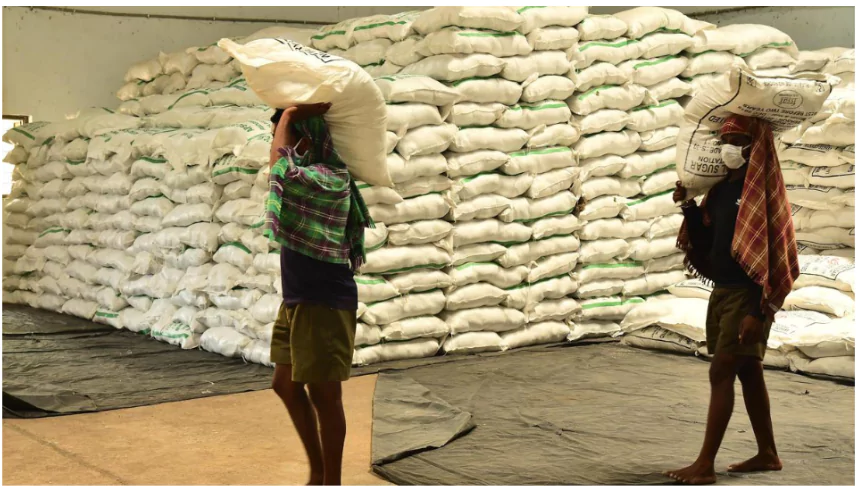The government has launched a pilot project to rename 60 Fair Price Shops (FPS), or ration shops, as ‘Jan Poshan Kendra’ across Gujarat, Rajasthan, Telangana, and Uttar Pradesh.
About Jan Poshan Kendras

- The initiative is designed to address the demands of ration dealers by offering them new income opportunities through these renamed shops.
- Objective: To modernize the shops and ensure affordable, quality nutrition for all, supporting the broader goal of community empowerment.
- These FPS will now provide food products to consumers while also helping FPS dealers earn more income.
- These Kendras will stock 50% nutrition-rich food items and keep some space reserved for other household essentials.
- It will help in offering customers more diverse product options.
Enroll now for UPSC Online Course
New Digital Tools
- The government also launched new tools, including:
- FPS Sahay App: Provides dealers with paperless financing options.
- Mera Ration App 2.0: Offers consumers easy access to information about the public distribution system.
- Quality Systems: New guidelines and accreditation of laboratories to ensure food quality and transparency.
|
Benefits of the Jan Poshan Kendra Initiative
- Enhanced Income for Ration Dealers:
- More Products: Jan Poshan Kendras will offer a wider variety of products, including nutritious foods and household items, boosting dealer sales and income.
- New Income Opportunities: The Kendras will help dealers explore new business options and earn extra income.
- Financial and Training Support: Dealers will get financial help and training to run their businesses better.
- Improved Nutrition for Consumers:
- Better Food Access: The Kendras will provide more nutritious food options for consumers.
- Affordable Prices: Ration shops will continue offering healthy food at low prices.
- Stronger Food Security System:
- Efficient Operations: Digitization will make the system more efficient, transparent, and reduce wastage.
- Quality Control: Strict quality measures will ensure high-quality products for consumers.
- Addressing Malnutrition: Increased access to nutritious food will help fight malnutrition.
- Empowerment of Local Businesses:
-
- Economic Growth: The initiative will create new business opportunities and support local economic development.
- Community Development: Jan Poshan Kendras will act as centers for community growth.
- Support for Dealers: SIDBI will offer easy credit, and the Ministry of Skill Development will provide entrepreneurship training to improve dealer skills.
Challenges of the Jan Poshan Kendra Initiative
- Implementation Challenges:
- Infrastructure: Building storage, transportation, and supply chain systems for more products, especially in rural areas, can be tough.
- Training: Dealers need extensive training on product knowledge, inventory, and customer service, which requires significant resources.
- Quality Control: Keeping product quality consistent across a wide range of items and suppliers is challenging.
- Regulatory Challenges:
- Compliance: Adhering to regulatory requirements for stocking and selling a wider range of products can be complex and time-consuming for dealers.
- Corruption: Ensuring transparency and preventing corruption in distribution and pricing is crucial for public trust.
- Financial Sustainability:
- Profitability: Ensuring that dealers can generate sufficient profits from selling additional products to cover the costs of storage, transportation, and other expenses is crucial for the sustainability of the initiative.
- Government Support: Financial help or subsidies from the government might be needed to help dealers manage expenses and stay profitable.
Check Out UPSC Modules From PW Store
Public Distribution System
- It is a government sponsored shop.
- Through this system, essential goods such as wheat & rice are distributed at an affordable price to card holders.
- Nodal Ministry: Ministry of Consumer Affairs, Food and Public Distribution
- Major commodities: wheat, rice, sugar and kerosene
- It is operated jointly by the central, state and UTs governments.
- Central government manages procurement, storage, transportation and bulk allocation of food grain through Food Corporation of India (FCI).
|
![]() 22 Aug 2024
22 Aug 2024
